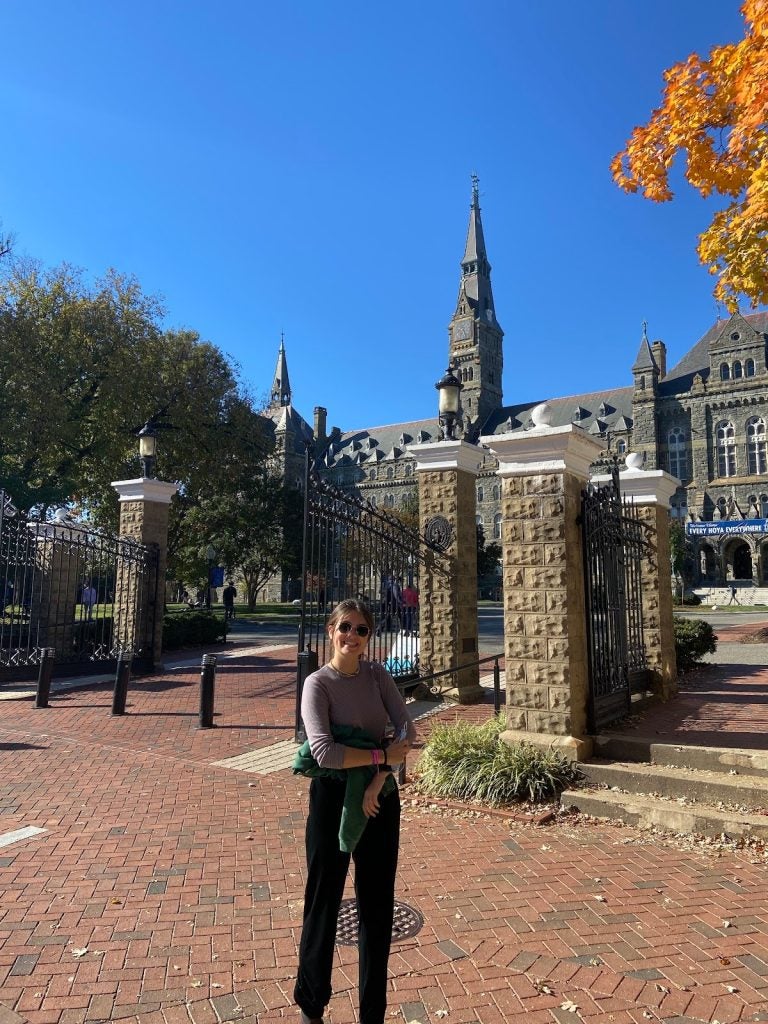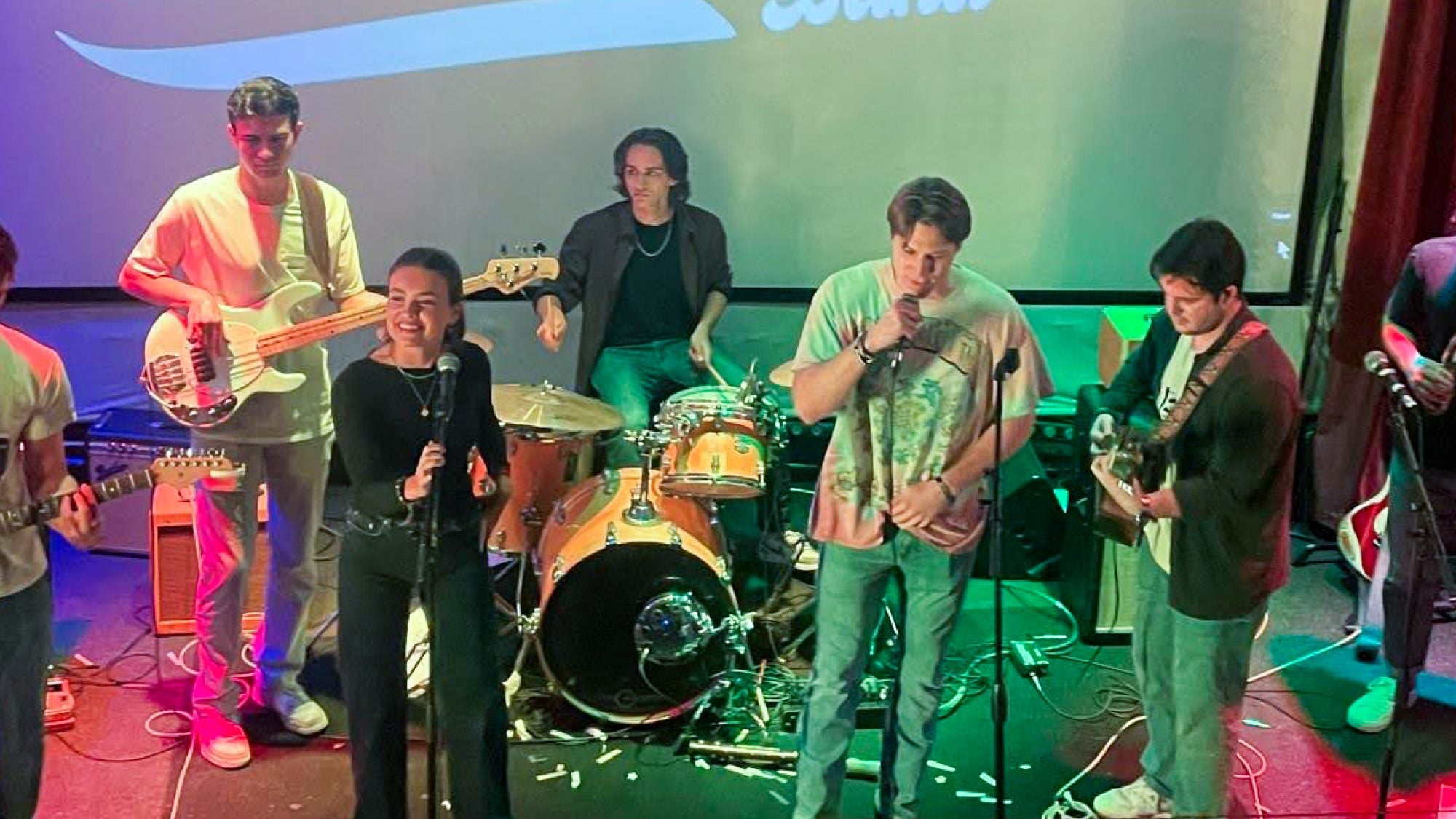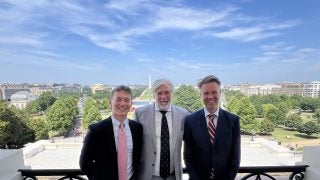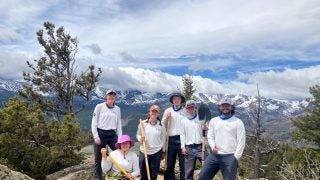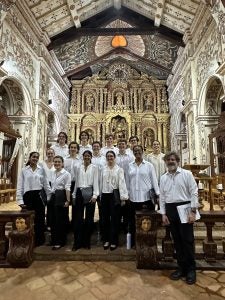
The plane landed, and junior Alexandra Gardner (C’25) rushed off it.
She had just come off a weeklong trip to Bolivia with the Georgetown Chamber Singers, singing in Jesuit churches in Santa Cruz as part of a biennial music festival.
Now she had another concert to attend to.
Gardner was starting an internship at Breaking Sound, a music company that showcases emerging artists, and tonight was her first day on the job. She arrived to the rooftop of DC’s Thompson Hotel from the airport and quickly realized that she was in charge of the whole concert. The music tech needed a cable for the show; the artists needed receiving; the tickets needed selling. Her stomach dropped. Could she handle all this?
Luckily, Gardner enjoys these types of challenges.
“I look for scenarios in which I’m being put at the forefront, because when you’re someone’s assistant, you’re not doing it yourself,” she said. “I appreciate being given that amount of responsibility and having the opportunity to learn so fast.”
That sense of pressure and challenge have driven Gardner in her two other internships this summer: working as a research intern in Georgetown’s Happy Tech Lab and an events intern for the Aspen Institute. She enjoys throwing herself into opportunities, she said, stretching her capabilities and strengths. It’s a skill she learned firsthand in the world of music.
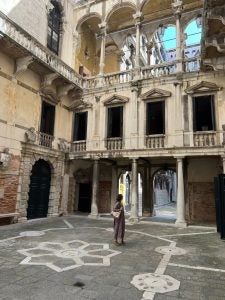
Studying Opera in Venice
Before attending Georgetown, Gardner, who grew up in London, spent a gap year at the Conservatory of Music Benedetto Marcello, a music school in Venice, Italy. She studied opera with a teacher who showed her a new way of singing.
“When you sing, you are the instrument. There’s no hiding in the shadows. You have to rely on yourself,” she said. “I think that is maybe why I am both mega terrified but also addicted to that feeling of, ‘It’s up to you. This is it.’ It made me feel like I was unlocking a new power.”
After the conservatory, Gardner knew she wasn’t going to become a professional singer, but she still wanted to be involved in music. Her internship of providing production support at Breaking Sound allows her to be immersed behind-the-scenes, helping other artists put on well-produced, “mesmerizing” shows, she said.
And when she’s not backstage, she’s working to support a vastly different project in DC.
The Happiness Lab
Gardner is double majoring in religion and psychology, and while she wants to work in events and operations after graduating, she ultimately plans to earn her master’s in psychology and become a therapist.
This past spring, she was looking for research opportunities to complement her major and was drawn to the Happy Tech Lab — both for its name and its mission to leverage technology to help improve health and well-being.
Gardner began as a research intern there in February, and this summer, she’s assisting Carli Ochs, a postdoctoral researcher, on an upcoming experiment led by Lab Director Kostadin Kushlev that studies how smartphones affect users’ well-being.
The team plans to examine why many smartphone users don’t alter their screen time use despite evidence pointing to its negative impacts on mental health and well-being.
“What fascinates me is that, despite having the knowledge that being on your phone won’t necessarily make you happier, we still make the choice to use our phones,” she said. “So how are we going to overcome this?”
To prepare for the experiment, Gardner has been poring through journals to ensure the study is novel and submitting proposals to the Institutional Review Board to make sure it’s ethically sound. While she feels pressure to describe the experiment accurately and not miss a similar study, Gardner also enjoys the steep learning curve.
“It really is the only way to learn how these things get done,” she said.
Gardner will continue to work on the study this fall, while simultaneously taking classes and working 25 hours at her Aspen Institute internship, which she started at the end of July. At the institute, she’ll work with the institute’s digital team on events like the Cyber Summit, which examines cybersecurity issues today.
It’ll be another challenge, she said. One she’s ready for.
